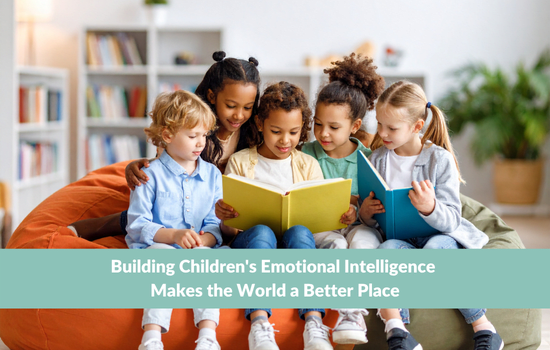We are living in a complex world, and children's emotional intelligence is emerging as a foundational skill essential for lifelong success. By intentionally developing social skills and engaging in emotional coaching, caregivers can harness the power of brain plasticity to promote positive relationships that ripple into a better society.
Children's Emotional Intelligence is a Learned Skill We Can Teach

Most will agree: if we want to make this world a better place, enhancing children's emotional intelligence is a crucial step. Because emotions mediate how we manage interactions, developing emotional awareness and regulation supports healthier connections in every sphere of life.
Emotional intelligence is not something children are born with; it is nurtured over time through experience, guidance, and intentional practice. Numerous studies confirm that EI can be taught via structured approaches. For example, teaching children to recognize, label, and regulate their emotions is closely tied to improved self-control, academic engagement, and fewer behaviour challenges. (Source: naeyc)
Moreover, according to PubMed Central, research shows children with lower EI are more likely to exhibit aggressive or maladaptive behaviours. Therefore, parents, family members, and caregivers play a pivotal role: by consistently applying emotional coaching techniques, they can help children internalize skills that will become automatic over time.
"I believe one of the greatest gifts we can give children is to provide them with skills that will assist them in developing strong social and emotional intelligence." — Linda Marshall, President, Marshall Connects Inc.
Creating Well-Rounded Children
Children with solid social skills tend to form deeper, more satisfying connections with peers and adults. When we teach them to interpret emotional cues in others, communicate effectively, and respond with empathy, they lay the groundwork for positive relationships across diverse contexts.
What's especially encouraging is the concept of brain plasticity, the idea that the brain remains malleable over time, allowing us (and children) to reshape neural pathways through repeated practice. (Source: National Library of Medicine) In fact, Sage Journals informs that interventions and emotionally supportive environments produce measurable changes in brain networks governing social and emotional functioning. Recognizing this offers hope: it's never "too late" to strengthen EI and social competence.
Talking About Emotions at Home Builds Emotional Intelligence
How often do families pause to discuss what's happening inside — the emotions, the triggers, and the coping mechanisms? More frequently than most do is ideal. When children learn that emotions are signals worthy of attention (not shameful or dismissible), they develop greater self-awareness and increased control.
Emotion coaching in the home, guiding a child gently through naming and managing emotions, is among the most evidence-based ways to build children's emotional intelligence. The Gottman Institute, for instance, reports that children whose parents practice emotional coaching tend to fare better academically, socially, and physically. Furthermore, parental emotional regulation is strongly linked to children's own emotional capacities. (Source: National Library of Medicine)
The process is not always straightforward. It involves:
-
Observing and acknowledging the child's emotional state
-
Validating the feeling ("I see you're upset")
-
Labelling and discussing the emotion
-
Helping the child find coping strategies
-
Reflecting (after things settle) on what they learned
Over time, these steps strengthen the child's internal emotional toolkit.
Balancing IQ and EQ for Lifelong Success
Of course, academic intelligence (IQ) remains a crucial factor. However, children who can regulate emotions, adapt to challenges, and maintain strong relationships often outperform peers who rely mainly on intellect. In one study of kindergarteners, emotion regulation predicted early academic success and better classroom engagement (even after controlling for IQ). (Source: National Library of Medicine)
Likewise, in primary schooling, emotional intelligence correlates positively with academic motivation, better grades, and fewer behavioural issues. Children with higher EI also show greater social competence and reduced vulnerability to bullying or victimization. (Source: BMC Psychology)
Because positive relationships influence learning, well-regulated children can form stronger bonds with teachers, mentors, and peers, which in turn further fuel their growth.
Practical Tips for Caregivers to Foster Emotional Intelligence & Social Skills
-
Model emotional literacy: Let your child hear you name your own feelings ("I'm frustrated right now") and how you're coping.
-
Create emotion check-ins: A daily or weekly ritual (e.g., "highs and lows of the day") normalizes open communication.
-
Read emotion-rich stories: Use books to pause and discuss characters' feelings, motives, and reactions.
-
Role-play tricky social scenarios: Practice conflict resolution, empathy, or responding to peer pressure.
-
Reinforce prosocial acts: Praise kindness, cooperation, and emotional insight when you notice them.
-
Be patient and consistent: Due to brain plasticity, repeated practice over months and years gradually rewires responses toward emotional balance.
Investing in children's emotional intelligence is not a soft add-on; it's a profound act of social change. By embedding social skills training and emotional coaching into daily routines, we harness the power of brain plasticity to reinforce empathy and resilience, fostering deeper human connections. As those children mature, their capacity to build positive relationships extends ripple effects throughout communities. The world truly becomes a better place when we equip the next generation with the skills to feel, understand, and relate with emotional wisdom. For more strategies to enrich emotional intelligence and empathy, explore my book, The Power of Emotion, and elevate your journey to meaningful success today.
This article was originally published on February 16, 2019, and has been updated (October 2025).
More Motivational Reads Here »
How Emotionally Intelligent Are You?
Sign up for Linda's monthly tips to build your Emotional Intelligence and reduce Emotional Hijacking!

















